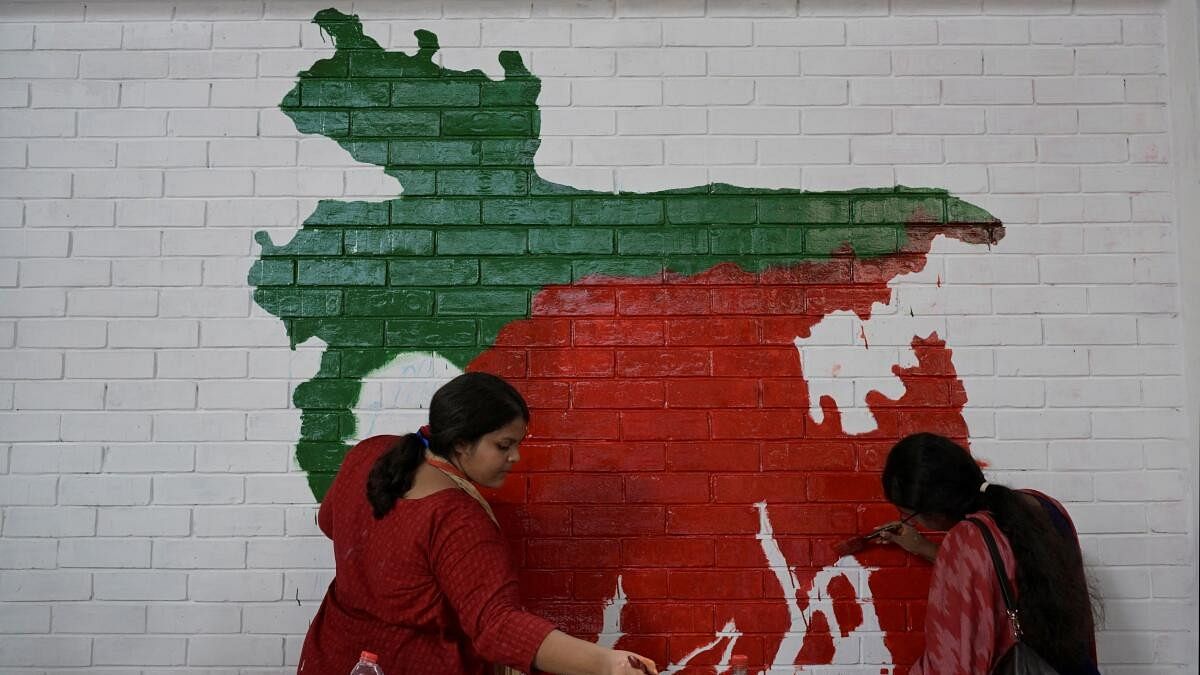
Students paint Bangladesh map on a wall alongside a road in Dhaka
Credit: Reuters Photo
By Dan Strumpf
Following weeks of bloody street protests, the inauguration of an interim government in Bangladesh kicks off a perilous new phase of political uncertainty — a potential threat to the country’s already shaky finances.
Nobel laureate Muhammad Yunus arrived in Dhaka on Thursday to effectively take over ousted Prime Minister Sheikh Hasina’s seat, meeting a central demand of the massive student-led protest movement. As head of the temporary administration — backed by the military with a murky mandate — his path won’t be easy.
Public services in the capital are still mostly suspended. Courts aren’t functioning smoothly. And over the past few weeks, the nation has bled more than a billion dollars in foreign currency reserves.
Bangladesh’s main opposition party has called for elections within 90 days, the period mandated in the constitution when Parliament is dissolved, but Yunus has yet to address that time frame. After Hasina’s 15-year rule ended with her resignation on Monday, the figurehead president disregarded a provision that said he must pick a replacement who commands majority support in Parliament, and dismissed lawmakers elected in a January vote that was boycotted by the opposition and roundly criticized by the US and others.
Yunus, 84, won the Nobel Peace Prize for his work pioneering microfinance, but he’s untested as a political administrator, adding to the uncertainty about how he’ll rule a nation of 170 million people. During brief remarks on Thursday, he kept the focus on appealing for peace after weeks of demonstrations.
Police work stalled due to a strike and reports are circulating of mobs hunting down leaders of Hasina’s Awami League. Whether she will return to Bangladesh to contest any eventual election is another question mark. Her son told Indian media that she would.
If the past is any guide, Yunus’s interim government might hang around for a while, giving it an active role in stabilizing the economy. After a 2007 coup, Bangladesh’s military backed another temporary administration. That one lasted for two years before elections were called.
The political limbo is especially treacherous given Bangladesh’s financial woes. Its economy, highly dependent on a giant garment-export industry, is currently drawing on a $4.7 billion loan program from the International Monetary Fund.
The 42-month lending package, inaugurated last January, was designed to relieve pressure on foreign-currency reserves — which have been declining steadily since the pandemic, when exports dropped and commodity prices climbed. Foreign reserves are down to $20.5 billion in July from a peak of $48 billion three years ago, as the economy ground to a halt under protests and curfews.
The most recent IMF installment in June cleared more than $1.1 billion. Future tranches depend on Bangladesh hitting benchmarks in areas like tax revenue collection, monetary policy framework and management of its public finances and banking sector. The interim government may struggle to juggle these demands with basic tasks like restoring calm to the streets.
Soumya Bhowmick, associate fellow at the Observer Research Foundation, a New Delhi-based think tank, said he expects the terms of the IMF program to change, with possibly tighter conditions if the interim government collapses or the economic situation deteriorates.
“If the economy goes downhill from here, Bangladesh might have to move to a bailout program from the IMF,” he said. Such programs typically come with significantly tougher terms, he added.
Darker clouds have been gathering over Bangladesh’s economy for some time. Though gross domestic product quadrupled under Hasina in the last 15 years, the country’s growth clip slowed in the first half of fiscal 2024. Headline inflation reached a decade-high in April, according to the IMF.
Against the backdrop of the protests, shutdowns in Bangladesh’s garment industry could cost the economy $10 billion, according to a business chamber, making it even harder to bolster foreign-currency reserves.
In addition to its loans from the IMF, Bangladesh is also seeking financial support from China to ease the strain on its foreign reserves. Last month, the government revealed it was in talks with Beijing for a yuan-denominated loan of about $5 billion.
Turmoil over the past few weeks, which left hundreds dead, is likely to shake up Bangladesh’s relations across the region.
For India, the fall of Hasina’s government is a blow. New Delhi had been a major backer of her regime, which it saw as a bulwark against the country’s Islamist elements. Some Bangladeshi activists had called for a boycott of Indian products earlier this year to protest New Delhi’s alleged interference in Bangladesh’s affairs.
It’s not yet clear whether China, India’s rival, stands to gain from the upheaval. Yunus is widely seen as having close ties to Western countries including the US, which has been cultivating partners in the region to counter Beijing.
The interim government may have little appetite to take on additional Chinese debt, given that “debt distress usually comes in the wake of China’s lending,” according to a report from Bloomberg Economics. Beijing’s Foreign Ministry on Friday said it respects the path the Bangladeshi people have chosen.
Still, Yunus’s sterling international reputation bodes well for a quick transition to greater political stability, said Mattias Martinsson, partner and chief investment officer at Sweden’s Tundra Fonder AB.
“Yunus was not only the students choice, but is also highly recognized abroad,” he said. “We think this could be one of those cases where a dramatic shift not only succeeds, but without the usual prolonged uncertainty.”